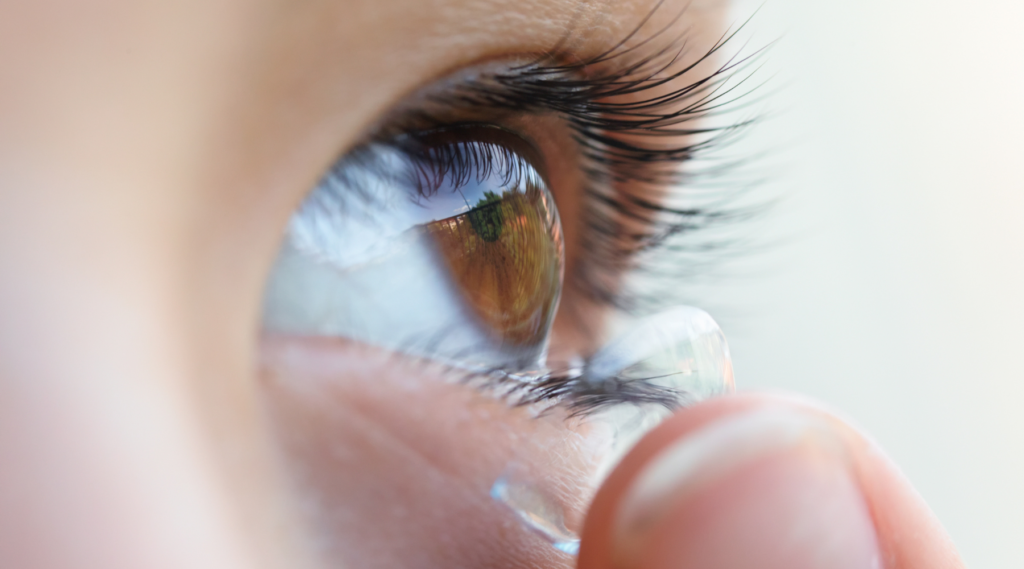There are many inconveniences when wearing glasses; foggy lenses, frames that fall off your nose, and restricted peripheral vision can somewhat interfere with one’s daily life. Because of this, millions of people have resorted to using eyesight lenses. If you want comfort, if you want clearer vision, or if you just want to change your appearance, contact lenses for eyesight are the applicable and oftentimes liberating alternatives to traditional eyeglasses.
This complete guide will cover everything about contact lenses you need to know, such as types, advantages, how to get a proper contact lens prescription, and wearing them safely.
What Are Contact Lenses?
Contact lense are thin, curved lenses resting directly on the surface of your eye, the cornea, and correcting vision just like glasses. These lenses are made with a wide range of soft or rigid materials carefully designed to allow the flow of oxygen to your eyes for health and moisture.
These tiny lenses for vision possess great power and are able to correct:
- Nearsightedness (myopia)
- Farsightedness (hyperopia)
- Astigmatism
- Presbyopia (age-related focus issues)
Benefits of Contact Lenses Over Glasses
Contact lense have their own unique benefits:
- Wider View: Contacts sit on the eye and give clearer peripheral vision.
- No Obstructions: No frames to obstruct your view or attention.
- Active Lifestyle: Perfect for sports and any outdoor activities.
- Freedom of Style: No more matching your frames to your clothes; colored contact lenses for eyesight can further glamorize your look.
Types of Contact Lense
Your own lifestyle, eye condition, and preference for comfort or convenience are all considerations while selecting the right kind of contact lenses.
1. Soft Contact Lense
Made from flexible, water-absorbing materials (hydrogels or silicone hydrogels), these are the most commonly used lenses.
- Daily Disposables: Use once and toss—great for hygiene and convenience.
- Bi-weekly/Monthly: Worn for 14–30 days with daily cleaning.
- Extended Wear: Can be worn overnight (check with your eye doctor first).
Pros:
- Extremely comfortable
- Easy to adapt to
- Available in options for astigmatism and presbyopia
2. Hard (Rigid Gas Permeable) Lenses
These lenses are less flexible but offer sharper vision and are more durable.
Pros:
- Long-lasting
- Superior oxygen flow
- Often recommended for people with high astigmatism or keratoconus
Cons:
- Take longer to get used to
- Can be uncomfortable for new users
3. Toric Lenses
Stabilizing correction will be achieved by toric lenses which have been custom designed from astigmatism. Toric lenses align themselves with the natural shape of your eye such that the lenses completely conform to it.
4. Multifocal & Bifocal Lenses
Ideal for an aging eye, it provides benefits in both din and draughts, making the perfect case for a person treated by presbyopia.
5. Colored Contact Lenses
Colored contact lense are available with or without the prescriptions and just are changing or intensifying the natural color of one’s eyes for purely aesthetic purposes. Always purchase lenses approved by the FDA even though it is just an aesthetic issue.
How to Get a Contact Lenses Prescription
The contact lens prescription is different from the eyeglass prescription because it includes additional measurements that indicate the contours and fit of your eyes.
What to Expect in an Eye Exam
- Vision test: Determines the power required in your lenses.
- Corneal measurements: To get the right lens curvature
- Tear film test: To assess dryness and suitability for lenses
- Trial fitting: Helps ensure comfort and proper positioning
Always procure your lenses from a certified provider; an online order still requires a valid prescription, which typically expires after one year.
Caring for Your Contact Lense
Proper lens hygiene is vital for healthy eyes and clear vision.
Key Tips:
- Wash your hands before handling lenses
- Use the correct solution (never tap water!)
- Clean and store lenses in a fresh case every day
- Replace lenses and cases as recommended
- Avoid sleeping in your contacts unless they are specifically labeled for extended wear.
Due to the failure to comply with the directions for taking care of them, the infection of your eyes, the irritations of your eyes, or worse, can result in permanent damage to vision.
Common Mistakes to Avoid
Even seasoned users can fall into bad habits. Here are some mistakes to watch out for:
- Wearing lenses longer than prescribed
- “Topping off” old solution instead of replacing it
- Ignoring discomfort or redness
- Skipping follow-up appointments
Are Contact Lense Safe?
The comfort and safety of contact lenses depend entirely on their use. Thanks to new material technologies, oxygen and moisture can now be passed even more easily without harming the lenses. Yet, improper usage can increase the risk associated with:
- Eye infections
- Corneal ulcers
- Dry eye symptoms
Always follow your optometrist’s guidance and never share contact lense, even for cosmetic purposes.
Who Should Avoid Contact Lense?
Most individuals, lenses are still likely to be used in vision correction, as there are most cases where some people will not be able to wear lenses for any of the reasons listed below. If you are experiencing any of these conditions:
- Chronic dry eyes
- Severe allergies
- Eye infections
- Extremely sensitive eyes
You may need specialized lenses or stick with glasses. Your eye care provider can help you decide.
Final Thoughts: Are Contact Lense Right for You?
Contact lenses are all about comfort, style, and vision correction that is convenient and discreet. Need daily lenses for convenience or specialty lenses for astigmatism or presbyopia? The ideal solution awaits you. Just keep in mind:
- Never compromise on your contact lenses prescription
- Practice good hygiene
- Regular eye examination is a must
With suitable lenses and care, you will enjoy crisp and clear vision and get rid of your frames for good. So, bid goodbye to glasses and hello to a more comfortable and confident you!
For more information and updates, feel free to visit Europefeeds.

